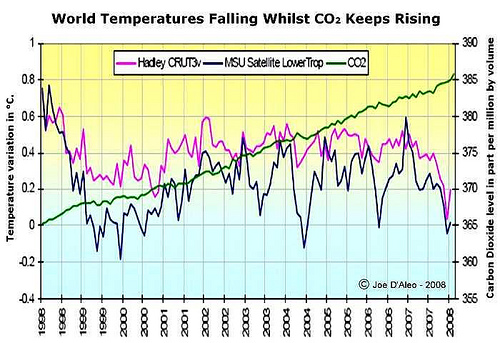It's coming with or without La Nina.
Four scientists: Global Warming Out, Global Cooling In
12 07 2008
Alan Lammey,
Texas Energy Analyst, Houston
Four scientists, four scenarios, four more or less similar conclusions without actually saying it outright the global warming trend is done, and a cooling trend is about to kick in. The implication: Future energy price response is likely to be significant.
Late last month, some leading climatologists and meteorologists met in New York at the Energy Business Watch Climate and Hurricane Forum. The theme of the forum strongly suggested that a period of global cooling is about emerge, though possible concerns for a political backlash kept it from being spelled out.
However, the message was loud and clear, a cyclical global warming trend may be coming to an end for a variety of reasons, and a new cooling cycle could impact the energy markets in a big way.
Words like highly possible, likely or reasonably convincing about what may soon occur were used frequently. Then there were other words like mass pattern shift and wholesale change in anomalies and changes in global circulation.
Noted presenters, such as William Gray, Harry van Loon, Rol Madden and Dave Melita, signaled in the strongest terms that huge climate changes are afoot. Each weather guru, from a different angle, suggested that global warming is part of a cycle that is nearing an end. All agreed the earth is in a warm cycle right now, and has been for a while, but that is about to change significantly.
However, amid all of the highly suggestive rhetoric, none of the weather and climate pundits said outright that a global cooling trend is about to replace the global warming trend in a shift that could begin as early as next year.
Van Loon spoke about his theories of solar storms and how, combined with, or because of these storms, the Earth has been on a relative roller coaster of climate cycles. For the past 250 years, he said, global climate highs and lows have followed the broad pattern of low and high solar activity. And shorter 11-year sunspot cycles are even more easily correlated to global temperatures.
It was cooler from 1883 to 1928 when there was low solar activity, he said, and it has been warmer since 1947 with increased solar activity.
We are on our way out of the latest (warming) cycle, and are headed for a new cycle of low (solar) activity, van Loon said. There is a change coming. We may see 180-degree changes in anomalies during high and low sunspot periods. There were three global climate changes in the last century, there is a change coming now.
Meanwhile, Madden noted that while temperature forecasts longer than one to two weeks out has improved, what has really gotten much better is climate forecasting
predicting the change in the mean, he said.
And the drivers impacting climate suggest a shift to cooler sea surface temperatures, he said.
Perhaps the best known speaker was Colorado State Universitys Gray, founder of the schools famed hurricane research team. Gray spoke about multi-decade periods of warming and cooling and how global climate flux has been the norm for as long as there have been records.
Gray has taken quite a bit of political heat for insistence that global warming is not a man-made condition. Man-made carbon dioxide (CO2) is negligible, he said, compared to the amount of CO2 Mother Nature makes and disposes of each day or century.
Weve reached the top of the heat cycle, he said. The next 10 years will be hardly any warmer than the last 10 years.
Finally, climate scientist Melita spoke of a new phase in the Pacific Decadal Oscillation.
Im looking at a new, cold-negative phase, though it wont effect this summer, fall or winter 08, he said.
Conference host, analyst and forecaster Andy Weissman closed the conference by addressing how natural gas prices and policy debates would be impacted by a possible climate shift that could leave the market short gas.
This would be especially problematic if gas use for power generation were substantially increased at the expense of better alternatives.
If were about to shift into another natural climate cycle, we cant do it without coal-fired generation. So the policy debate has to change, he said. Coal has to be back on the table if were ever going to meet our energy needs.
As for natural gas: Next year, may see a bit of price softening, Weissman said. After that, fogetaboutit!.








